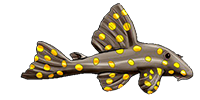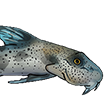Freshwater Invertebrates among the catfish
- apistomaster
- Posts: 4735
- Joined: 10 Jun 2006, 14:26
- I've donated: $90.00!
- My articles: 1
- My cats species list: 12 (i:0, k:0)
- My Wishlist: 1
- Location 1: Clarkston, WA, USA
- Location 2: Clarkston, WA, USA
- Interests: Aquaculture and flyfishing
Freshwater Invertebrates among the catfish
The other category of some very interesting animals that i keep among my Catfish are shrimp and dwarf crayfish.
Ihave the following:
Red Cherry Shrimp set uo in several colnies of several hundred each. I am able to combine raising cherry shrimp in Corydoras fry grow out combos and theyseem to do well together
Cambarellus shufeldti Dwarf Cajun Crayfish, small colony.
6 Singapore Bamboo Shrip, filterfeeding feinds, actually completely harless that love the powerhead driven sponge filter currents in my Sturisoma aureum tank. They all vy for the best place to get the best flows and add a touch of the bizarre, as if the Sturisoma don't already do this.
Common Ghost Glass Shrimp
I keep these everywhere they fit in with everything from my Discus to my Pleco set ups and add some action to places like pleco set ups that sometimes seem otherwise empty when all the plecos are holed up.
Ihave the following:
Red Cherry Shrimp set uo in several colnies of several hundred each. I am able to combine raising cherry shrimp in Corydoras fry grow out combos and theyseem to do well together
Cambarellus shufeldti Dwarf Cajun Crayfish, small colony.
6 Singapore Bamboo Shrip, filterfeeding feinds, actually completely harless that love the powerhead driven sponge filter currents in my Sturisoma aureum tank. They all vy for the best place to get the best flows and add a touch of the bizarre, as if the Sturisoma don't already do this.
Common Ghost Glass Shrimp
I keep these everywhere they fit in with everything from my Discus to my Pleco set ups and add some action to places like pleco set ups that sometimes seem otherwise empty when all the plecos are holed up.
Avid Trout fly fisherman. ·´¯`·...¸><)))º>
-
chris 1
- Posts: 52
- Joined: 02 Nov 2006, 04:03
- I've donated: $50.00!
- My cats species list: 13 (i:0, k:0)
- Spotted: 1
- Location 1: London. England
- apistomaster
- Posts: 4735
- Joined: 10 Jun 2006, 14:26
- I've donated: $90.00!
- My articles: 1
- My cats species list: 12 (i:0, k:0)
- My Wishlist: 1
- Location 1: Clarkston, WA, USA
- Location 2: Clarkston, WA, USA
- Interests: Aquaculture and flyfishing
Hi Chris,
I believe you are correct. And if not sea or euryhaline environments, they(larvae) may have to spend time in a large lake where there is a complex community of phyto and zooplankton where the may join in the community to feed(and be fed upon).
I am not knowledgeable enough about their range and it may be they are entirely freshwater but still require an environment found in large lakes. There they could possibly undergo their planktonic phase of their life cycle. There a many parallels in nature, such as the North American landlocked salmon called Kokanee, that have abandoned the ocean, downsized, and live out their life cycle in entirely freshwaters. Living in the lake, feeding on zooplankton, running upstream to spawn,then die as their full sized searun cousins, the silver salmon.
I believe you are correct. And if not sea or euryhaline environments, they(larvae) may have to spend time in a large lake where there is a complex community of phyto and zooplankton where the may join in the community to feed(and be fed upon).
I am not knowledgeable enough about their range and it may be they are entirely freshwater but still require an environment found in large lakes. There they could possibly undergo their planktonic phase of their life cycle. There a many parallels in nature, such as the North American landlocked salmon called Kokanee, that have abandoned the ocean, downsized, and live out their life cycle in entirely freshwaters. Living in the lake, feeding on zooplankton, running upstream to spawn,then die as their full sized searun cousins, the silver salmon.
Avid Trout fly fisherman. ·´¯`·...¸><)))º>
- apistomaster
- Posts: 4735
- Joined: 10 Jun 2006, 14:26
- I've donated: $90.00!
- My articles: 1
- My cats species list: 12 (i:0, k:0)
- My Wishlist: 1
- Location 1: Clarkston, WA, USA
- Location 2: Clarkston, WA, USA
- Interests: Aquaculture and flyfishing
That is correct.
There are two species of Pacific Salmon that have landlocked forms here in the Pacific NW. I get them mixed up. We only have .about six or eight species depending on which taxonomic scheme you apply. And then there are individual strains of salmon and steelhead adapted to nearly every major drainage and it's tributaries At least they are natives and not introduced like the ones transplanted to the Great Lakes. It allows for them to used as an example of what is possible. A direct comparison is possible between the life cycles of the searun and the landlocked forms.
I flyfish for trout and the kokanee live deep and generally stay small so I never delved into them very much except to tie flies that look enough like them to catch Bull Trout that eat them during their spawning runs up lake tributaries.
The point of it was not wrong. The same general idea that there are ways animals normally found in the salt part of their lives have formed races or subspecies that have obviated the need to include saltwater from their life cycles. It follows that some shrimp may have evolved to be able to complete their life cycle entirely in freshwater.
Knowledge about the freshwater shrimp now being kept in aquaria is still in it's infancy.
There are two species of Pacific Salmon that have landlocked forms here in the Pacific NW. I get them mixed up. We only have .about six or eight species depending on which taxonomic scheme you apply. And then there are individual strains of salmon and steelhead adapted to nearly every major drainage and it's tributaries At least they are natives and not introduced like the ones transplanted to the Great Lakes. It allows for them to used as an example of what is possible. A direct comparison is possible between the life cycles of the searun and the landlocked forms.
I flyfish for trout and the kokanee live deep and generally stay small so I never delved into them very much except to tie flies that look enough like them to catch Bull Trout that eat them during their spawning runs up lake tributaries.
The point of it was not wrong. The same general idea that there are ways animals normally found in the salt part of their lives have formed races or subspecies that have obviated the need to include saltwater from their life cycles. It follows that some shrimp may have evolved to be able to complete their life cycle entirely in freshwater.
Knowledge about the freshwater shrimp now being kept in aquaria is still in it's infancy.
Avid Trout fly fisherman. ·´¯`·...¸><)))º>




